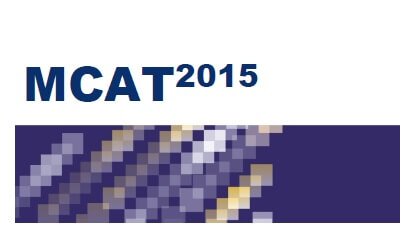What does the new MCAT have in store for you? The AAMC lets us in on some of the secrets.
On February 14, 2012, StudentDoc participated in a Webinar by the Association of American Medical Colleges (AAMC) on the new format of the MCAT scheduled to roll out in 2015, aptly known as MCAT 2015.
Why is the MCAT changing?
The AAMC wants to make MCAT scores more useful to admissions committees. Since there are changes in patient populations (older, more diverse, specific areas are underserved) and the delivery system is changing (healthcare reform), the competencies that committees are looking for in applicants are changing.
Medical schools are looking for applicants not only with specific academic competencies but also personal competencies like integrity and service orientation. To get to some of these issues, they’ve added topics like sociology and behavioral sciences as well as the use of ethics questions in the new critical analysis and reasoning section.
It’s also time to change. This is only the fifth review of the MCAT since 1928. The last review led to the current exam that started in 1991. The new MCAT 2015 will likely be in place until at least 2030 – perhaps even longer.
How will the MCAT be different?
The new MCAT changes are designed to make the exam more interdisciplinary. This means passages and free-standing questions will deal with overlapping concepts from different disciplines rather than asking just biology or just physics questions.
The AAMC will be preserving a focus on natural science concepts but dumping the writing sample (do we hear cheering?). It turns out most medical school admissions committees do not use the writing score in their assessments.
The writing sample will be eliminated after the last administration of 2012 (that is, there will be no writing sample administered starting in 2013). The time will instead be used on a “trial” block of questions.
The format and score will also change. There will now be four sections: three sections that cover social and behavioral sciences and one section on critical analysis and reasoning. You will get a score (probably on a 15-point scale, but that hasn’t been finalized) for each section.
MCAT Topics
Biological and biochemical foundations of living systems, covers topics like:
- Biomolecules have properties that contribute to structure and function of cells.
- How highly organized assemblies of different complexity levels interact to carry out functions of living organisms.
- Comes from information learned in the first two semesters of intro biology, general chemistry, organic chemistry, and the first semester of biochemistry.
- There will be more biochemistry that on the current exam.
Chemical and physical foundations of biological systems:
- Organism-based concepts like transport, sensation, signal processing
- Would test concepts like motion energy, fluids, circulation
- Chemical interactions
- Comes from information learned in the bio, gen chem, orgo, biochem courses plus physics
Psychological, social, and biological foundations of behavior covers concepts like how psychological and social factors affect:
- How we perceive ourselves and others
- How social stratus and culture affects well being
- Comes from information learned in the intro psychology, intro sociology, and intro biology
The critical analysis and reasoning section does not draw from any specific topic or subject area, and will test primarily reading comprehension, evaluation, application, and incorporation of information.
Passages will drawn from a variety of humanities and social sciences areas, and include among other topics, ethics and cross-cultural studies.
This section will be similar to a verbal reasoning section, but there will be no passages from sciences, just humanities.
Who will be taking the new MCAT, who takes the old MCAT?
New exam will be introduced in spring 2015. So people entering this fall will take the exam as a junior.
How best to prepare for the MCAT?
We start with MCAT tutoring because long before programs by the big companies will be formalized, individuals will be able to provide one-on-one support for MCAT prep. Yes, tutoring is more expensive than large, class-size courses, but it’s also a lot more effective in making sure you know the material.
While there are new sections and topics covered on the MCAT, it sounds like there will be a lot of overlap with the old exam. That means that a lot of the material in formal MCAT prep courses, like those of The Princeton Review and Kaplan, will still be valid. Because AAMC is putting out a lot of information on the new sections, these companies will be furiously updating their courses.
Other factoids
The new test will be longer: each section will be 90-95 minute sections, so with lunch the exam will run seven hours.
The AAMC will increase the number of questions in each section to increase the accuracy of the score.
There will also likely be an increase in testing fees to cover the higher costs of a longer test.
It is not clear if medical schools in 2016 will still accept the “old” MCAT version.
Practice materials for the MCAT 2015 are expected, with the first MCAT practice test set to be released in 2014, and a second in 2015.
The AAMC is putting together “Prehealth iCollaborative,” a repository of free online content intended for faculty to easily incorporate appropriate content into their courses.
There will be no adaptive changes to questions during the exam, so your performance will not affect the difficulty of subsequent questions.
Scoring for the new exam has not yet been finalized. The committee recommended keeping a similar score range to avoid confusion between old test and new test. So you can expect an approximately 15-point scale for each section, but now with four sections, and no verbal section.
It is possible that there will be an artificial bump in verbal scores starting in 2013 since there will be no writing sections, and students may be less fatigued when they do the biology section.
Official MCAT Self-Assessment Packages are set to be released in the spring 2012. The MCATsap will give students a detailed analytic summary of their strengths and weaknesses.
You can see the concepts to be tested and in which courses these are taught in the MCAT preview guide.
It is not clear if there will be any changes to or an expansion of the testing schedule.
Topics #2015 #aamc #mcat

